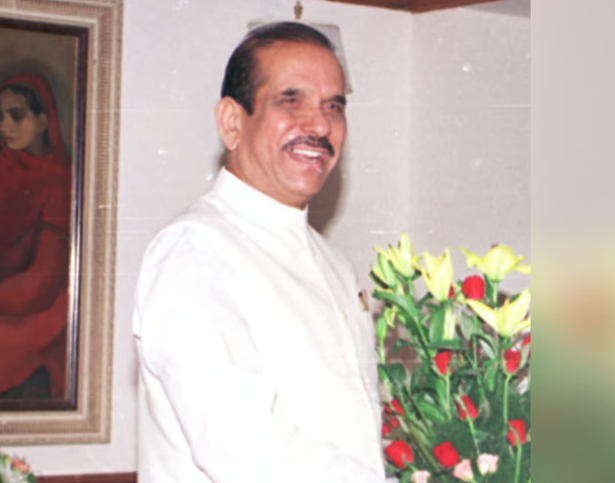The remarkable journey of Manohar Joshi, from his lawyer roots to becoming Maharashtra’s iconic Chief Minister. Explore his achievements, controversies, and lasting impact in this ultimate guide. (2024 Update)

Manohar Joshi: A Life Committed to Public Service and Maharashtra
On February 23, 2024, Manohar Gajanan Joshi, the mysterious leader who guided Maharashtra through difficult times, departed from this life. He left behind a political acumen and a steadfast dedication to his state. Joshi, who was born in 1937, had a life that reads like a gripping political narrative. He played a variety of roles and had a lasting impression on Indian politics. This blog explores Manohar Joshi’s extraordinary life story, including his ascent to prominence, important accomplishments, and lasting legacy.
Manohar Joshi’s Political Journey: A Table Summary
| Position | Term | Preceded by | Succeeded by | Notes |
|---|---|---|---|---|
| Mayor of Mumbai | 1976-1977 | Mehta | Murli Deora | – |
| Councillor, Brihanmumbai Municipal Corporation | 1968-1972 | – | – | – |
| Member of Maharashtra Legislative Council | 1972-1989 | – | – | Nominated |
| Leader of the Opposition, Maharashtra Legislative Assembly | 1990-1991 | Mrinal Gore | Gopinath Munde | – |
| Member of Maharashtra Legislative Assembly | 1990-1999 | Sharayu Thakur | Vishakha Raut | Dadar Constituency |
| 12th Chief Minister of Maharashtra | 1995-1999 | Sharad Pawar | Narayan Rane | – |
| Leader of the House Legislative Assembly, Maharashtra | 1995-1999 | – | – | – |
| Member of Parliament, Lok Sabha | 1999-2004 | Ramdas Athawale | Eknath Gaikwad | Mumbai North Central Constituency |
| Minister of Heavy Industries and Public Enterprises | 1999-2002 | Chandra Shekhar | Anant Geete | Atal Bihari Vajpayee’s cabinet |
| 13th Speaker of the Lok Sabha | 2002-2004 | G. M. C. Balayogi | Somnath Chatterjee | A. P. J. Abdul Kalam & Atal Bihari Vajpayee’s government |
| Leader of Shiv Sena | 1966-2024 | Bal Thackeray (1966-2012), Uddhav Thackeray (2012-2022), Eknath Shinde (2022-) | – | – |
| Member of Parliament, Rajya Sabha | 2006-2012 | Ram Jethmalani | Anil Desai | Maharashtra Constituency |
| Personal Details | ||||
| Birthdate | December 2, 1937 | – | – | – |
| Place of Birth | Raigad, Bombay Province, British India | – | – | – |
| Date of Death | February 23, 2024 | – | – | Aged 86 |
| Spouse | Anagha Joshi | – | – | – |
| Children | 3 | – | – | – |
| Political Party | Shiv Sena | – | – | – |
From Law Officer to Education Entrepreneur: Manohar Joshi’s Journey Beyond Politics
While Manohar Joshi’s political career is well-known, his early foray into education and entrepreneurship deserves recognition. Here’s a closer look:
From Officer to Educator:
- After earning his law degree, Joshi started his professional career at the Brihanmumbai Municipal Corporation (BMC) as an officer.
- However, his passion for education led him to establish the Kohinoor Technical/Vocational Training Institute. This institute aimed to bridge the gap by providing semi-skilled youths with practical training in trades like electrician, plumber, TV/radio/scooter repairman, and photographer.
- The institute’s success led Joshi to open multiple branches in Mumbai, Pune, Nagpur, and Nashik, catering to a wider pool of students.
Expanding Horizons:
- Joshi’s entrepreneurial spirit didn’t stop there. He ventured into construction and other capital-intensive businesses, showcasing his diverse interests.
Investing in Education:
- Passionate about education, Joshi founded the Kohinoor Business School and the Kohinoor-IMI School of Hospitality Management in Khandala, Maharashtra. These institutions provided higher education opportunities in specialized fields.
- His commitment extended to becoming the Chancellor of Dnyaneshwar Vidyapeeth, further emphasizing his dedication to educational advancement.
Joshi’s journey beyond politics highlights his multifaceted personality:
- He wasn’t just a politician; he was an educator and entrepreneur who recognized the importance of practical skills and higher education.
- His initiatives aimed to empower individuals and contribute to the development of Maharashtra’s workforce.
From modest beginnings to a dominant position in politics:
Joshi started his adventure in the Maharashtra village of Nandvi. His schooling, which resulted in master’s and law degrees, set him up for a successful legal career. But destiny had other ideas. Joshi joined the Shiv Sena, a political organization that supports Marathi identity and regional goals, after feeling compelled to serve the public. His brilliant mind, persuasive oratory abilities, and endearing demeanor helped him rise through the ranks.
A Head of State Who Dares to Be Unique:
In 1995, Joshi became Maharashtra’s first Chief Minister to be elected outside the Congress, defying political expectations. During his tenure, he made audacious decisions and unattainable goals. He concentrated on school reform, electrification of rural areas, and infrastructural development. His focus on Marathi language and culture struck a chord with the general public, establishing him as an advocate for regional identity.
Beyond Maharashtra: The Emergence of a National Figure
Joshi’s impact extended beyond state lines. From 2002 to 2004, he held the position of Speaker of the Lok Sabha, showcasing his adeptness in navigating the intricate realm of national politics. He was respected by people of all parties for his cool-headedness and fair but tough leadership.
A Contentious Legacy: Analysing Both Viewpoints
Joshi had a fair share of controversy throughout his political career. His affiliation with the Shiv Sena, a political movement renowned for its assertiveness, caused some people to take offense. During his time as Chief Minister, he was accused of being biased and authoritarian. On the other hand, his advocates argued that Maharashtra needed his decisiveness to take on difficult problems and establish a strong national identity.
Manohar Joshi’s Controversial Past: A Simplified Explanation
Joshi’s career wasn’t without its dark spots. Here’s a simpler breakdown of two major controversies:
1. Role in 1992-93 Riots:
- An official inquiry blamed Joshi and his mentor, Bal Thackeray, for inciting violence against Muslims during the riots.
- Joshi denied the charges and called the report biased.
2. Land Deal Controversy:
- As Chief Minister, Joshi allowed a plot of land meant for a school to be given to a builder close to his son-in-law.
- A persistent activist fought the case legally, leading to Joshi’s resignation.
- Courts declared the land deal illegal and fined Joshi. The land is now being used for its intended purpose, a school.
After his resignation as Chief Minister, Manohar Joshi’s political journey continued in the national arena:
1. Entering the Lok Sabha:
- He successfully contested the 1999 Lok Sabha elections from the Central Mumbai constituency, stepping onto the national stage.
2. Speaker of the Lok Sabha:
- During the 2002-2004 period, Joshi served as the Speaker of the Lok Sabha, presiding over the lower house of the Indian Parliament. This role demanded impartiality and leadership in managing debates and ensuring the smooth functioning of the house.
3. Transition to Rajya Sabha:
- In the subsequent Lok Sabha elections, Joshi faced a setback, losing his Central Mumbai seat. However, he continued his political involvement by getting elected to the Rajya Sabha, the upper house of Parliament, in 2006. This six-year term provided him another platform to contribute to national politics.
Beyond Politics: A Cultural and Family-Oriented Man (Manohar Joshi)
Joshi was a man with a wide range of interests in addition to being a politician. In addition to being an avid reader, he loved the theatre and music. He loved spending time with his wife and kids and found comfort in their company. His public presence gained depth and dimension from this complex personality.
A Life Well-Lived: Significance and Heritage:
Manohar Joshi is a wonderful example of the value of commitment and persistence in life. From modest origins, he ascended to become a crucial player in Indian politics. His devotion to regional identity and his contributions to the development of Maharashtra are still noteworthy. He may not have left a lasting legacy, but there is no denying his influence on the political climate of the state.
With Joshi’s death, a chapter in Maharashtra’s political history has closed. Let’s consider the virtues he personified as we honor him: a commitment to public service, the bravery to face difficult choices, and an enduring love for his state. His life narrative is a source of inspiration for future leaders and a reminder that, with unshakable dedication and service to the greater good, even regular people can do exceptional things.
Also read: What Happened to Rituraj Singh
